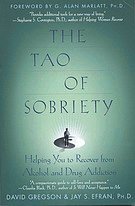The Tao of Sobriety: Helping You to Recover from Alcohol and Drug Addiction

Chapter headings:
- Foreword
- Chapter 1: Introduction
(A word about twelve-step programs; what is the Tao?) - Chapter 2: Alcohol, drugs and you
(Discovery 1: innocence in spirit; Aaron’s story; reality-altering substances; more gain than pain; beyond alcohol and drugs) - Chapter 3: I think, therefore I am
(Odd insights about us; Who’s the boss?; Journeying deeper into being; A practical example; Discovery 2: listening to the internal conversation; Who are you?; Discovery 3: the space that is you; The one and the other; Higher math: the one and the many; Discovery 4: discovering who you are; Who’s got the power?) - Chapter 4: Managing the mind
(Discovery 5: enhancing the manager; Biker Stan; Discovery 6: making a commitment; Discovery 7: mindfulness and detachment; Practice makes perfect) - Chapter 5: Conversing with drugs and alcohol
(Discovery 8: reflecting on chemical substances and you; A proof of innocence; Discovery 9: a heart of innocence) - Chapter 6: Attaining balance
- Chapter 7: Revitalizing desire
(Discovery 10: identifying mental banditos; Ted’s story) - Chapter 8: Re-examining transgressions
(Discovery 11: transgression inventory; Laura’s story; The hopelessness monster; David’s story; The possibility of possibility; Discovery 12: acknowledging possibility; Possibility and patience; The pleasures of irresponsibility) - Chapter 9: Thoughts, feelings, actions
(Knowing more about your system; Furthering detachment) - Chapter 10: Practicing detachment
(Discovery 13: an inch that’s greater than a mile; David’s bugs; Good self-talk; Hacking a new path; Jack’s story; Discovery 14: practicing self-talk) - Chapter 11: Strengthening Commitment
(The hoax of winning; Taking the good with the bad; Discovery 15: attack of the aliens) - Chapter 12: Life as theater
- Chapter 13: Revising the script
(The power of commitment; Discovery 16: reflecting on your life as a story; Discovery 17: a replay with the manager in charge; Discovery 18: self-beliefs) - Chapter 14: Reality and illusion
(The middle way revisited; A real-life video game) - Chapter 15: Plenty of nothing
(Discovery 19: one is the loneliest number; Bringing it home) - Chapter 16: Acceptance: Choosing Life
(Defining acceptance; Inclusion and exclusion; The acceptance of suffering; Discovery 20: expanding acceptance; Avoiding a steady state) - Chapter 17: Retracing the journey
- The Tao of Sobriety in a Nutshell: A Handy Crib Sheet
- References
Selected excerpts:
The Tao of Sobriety in a Nutshell: A Handy Crib Sheet (p. 173)
[Only the first five of eleven points are provided here]
1. Alcohol and drugs mitigate your experience of reality. If you have become dependent on alcohol and drugs, you are running from problematic aspects of your own experience.
2. Your mind is a space where many competing internal conversations vie for power.
3. You can elect a mental manager who takes a stand for maximizing love and well-being for yourself and others.
4. Your manager is up against some ferocious mind demons who preach negative messages of guilt, shame, and hopelessness.
5. To tame this unruly bunch of naysayers, your manager needs to learn mindfulness – the practice of detached observation.
© 2002 David Gregson & Jay S. Efran
Order this book online at Amazon
Reviews posted:
Paul –
I found this an interesting book containing techniques and exercises to address subjects such as eliminating shame and guilt, cultivating detachment, and cultivating unconditional acceptance. Having two writers, one a Psychology Professor and the other a counselor with first hand experience of dependency issues provides a good balance. Naturally this book has a more Taoist emphasis than the other books listed, so is keen to look at paradoxes and the marriage of opposites. The discussion on guilt is the best I have ever read. I like the perspective that dependency issues aren’t our fault, yet we are fully responsible for our actions.
Michael –
A Psychology Professor and a drug & alcohol counselor have provided a well balanced approach to the emotional and mental aspects of recovery in this book. Using the language of recovery with reference to “The Committee” in one’s head, they offer a practical path to integration of self, from management to hopeful elimination of those many negative voices that hold us back. Personally I first came to the Eastern Traditions through Taoism, and I very much enjoyed the gentle but practical influence of Taoism, Buddhism and Eastern philosophy in this book. I was reminded whilst reading it of Taoism’s later influence on Zen Buddhism. The book has something of a taste of the paradox and the stripped down simplicity of that tradition. Using psychology as a tool to find the Middle Way in our own minds, I believe this book offers a great path for calming the great ongoing inner battle that many in recovery can suffer from. This could well provide the basic text for the emotional and mental recovery that many seek.
